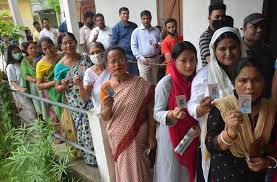Dynastic politics has once again become a key talking point in Assam’s by-polls, as the state gears up for its crucial elections on November 13. The political landscape has been heated with new allegations and counter-allegations, primarily between the Bharatiya Janata Party (BJP) and the Congress. The central issue that has captured the imagination of voters revolves around the influence of political dynasties, which both parties claim to be either benefiting from or attempting to dismantle. With the political battle intensifying, this by-poll has become more than just a contest for seats—it has transformed into a fight for the soul of Assam’s future.
The BJP, which has been in power in Assam for several years now, has been under fire for promoting what some critics view as a “dynastic agenda.” The party, which initially rode to power with promises of breaking away from old political traditions, now finds itself embroiled in similar accusations that it once leveled against its rivals. The recent selection of candidates for the by-polls has reignited debate over the influence of political families in the state’s politics. In particular, the BJP’s candidate selection has drawn the ire of several opposition leaders, who claim that the party is favoring family members of senior politicians, thereby perpetuating dynastic politics.
On the other side of the spectrum, the Congress, once the dominant force in Assam, has also been accused of fostering dynastic rule. Several high-profile candidates from the party have strong family connections, particularly in constituencies where the Congress has traditionally enjoyed significant influence. Critics of the Congress argue that while the party projects itself as a champion of secularism and democracy, it continues to promote its own brand of dynastic politics, which undermines the spirit of equal opportunity in the political arena.
The latest round of accusations stems from a series of high-profile speeches and statements made by key leaders from both parties. BJP leaders have openly attacked the Congress for its dynastic leadership, pointing out that several of its top leaders in Assam come from politically influential families. They have made the case that the Congress is only perpetuating political nepotism, where only certain families have access to power and resources. BJP’s rhetoric has strongly focused on how the Congress continues to prioritize family connections over merit, which, according to them, harms the overall democratic process.
Meanwhile, the Congress, not one to shy away from a fight, has retaliated by highlighting the same allegations against the BJP. According to Congress leaders, the BJP’s own rise in Assam has been closely tied to family connections and favoritism. They have cited the party’s candidate selections in the past, which have allegedly favored those with ties to influential figures within the party. For the Congress, the BJP’s accusations of dynastic politics ring hollow, given the party’s own reliance on family-based political ties in several regions of the state.
As the by-polls near, political observers have pointed out the growing frustration among voters who feel alienated by the ongoing dynastic politics. Many voters express dissatisfaction with both major parties and wish to see new faces and voices in the political landscape. There is a general sense of disenchantment, especially among the younger demographic, who are eager for change and hope to break away from the old guard of political dynasties that have dominated the state for decades. Voter sentiment seems to be increasingly shifting towards leaders who come from humble beginnings and have shown an ability to connect with the grassroots rather than those who benefit from their family’s legacy.
This growing discontent with dynastic politics has placed both the BJP and the Congress in a precarious position as they face off in the November 13 by-polls. Both parties are working hard to present their candidates as independent thinkers capable of representing the people of Assam. However, the shadow of dynastic politics looms large, and it remains to be seen whether the electorate will reward these political families or demand a shift towards fresh leadership that prioritizes merit over lineage.
As Assam’s voters prepare for the upcoming elections, it is clear that dynastic politics will continue to play a pivotal role in shaping the outcome. How much influence political legacies will have in determining the future of Assam remains uncertain, but it is likely that this issue will dominate the discussions in the run-up to the by-polls.

